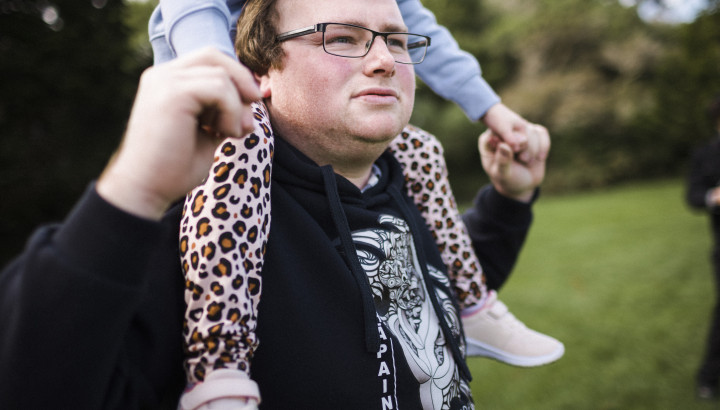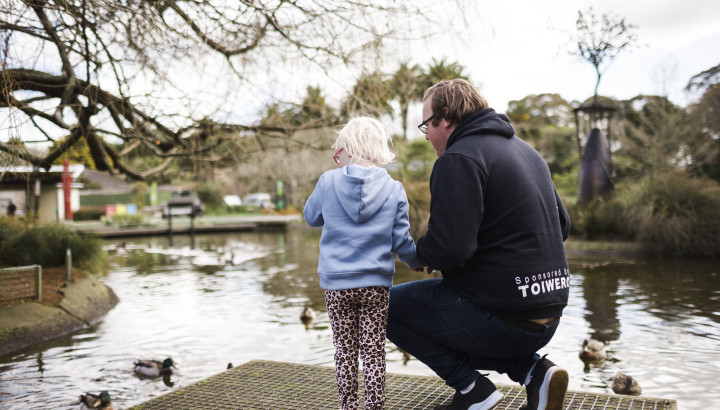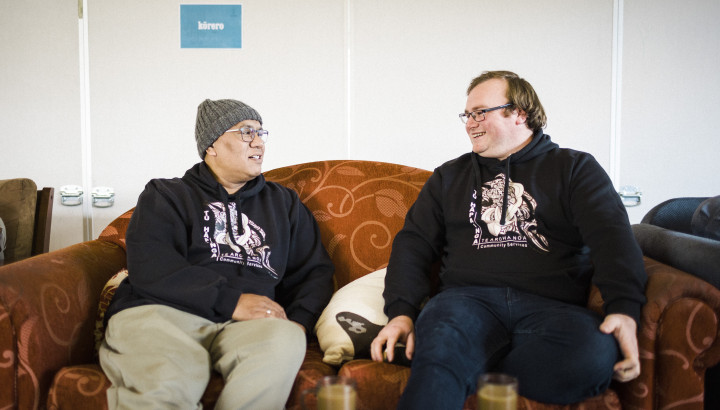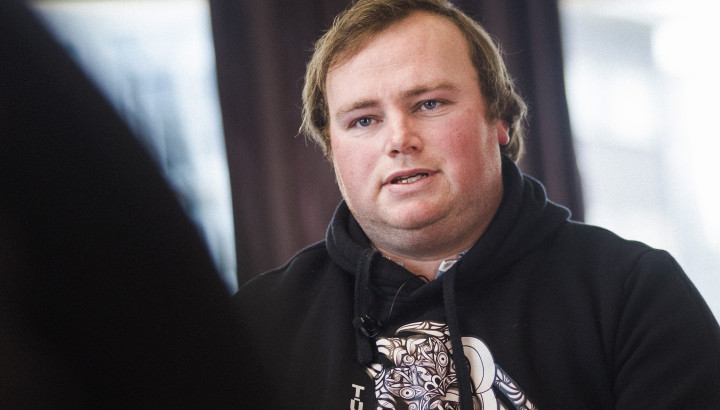Join Josh on his emotional journey as he opens up about his struggles with grief and abuse, and how he found support in a men's group. See how he learned to be a better father and support system for his daughter.
Soft piano music plays continuously in the background for the duration of the film. On a black screen is the text ‘Warning. This video contains discussions of violence and sexual assault. Viewer discretion is advised.’
Josh, a pākehā guy with dark blonde hair walks hand in hand with his daughter. Josh is wearing a black sweatshirt with a traditional Māori design on it in white, and black pants. His daughter, whose face is not shown throughout the video, has chin length blonde hair. She is wearing a blue sweatshirt, leopard print leggings and red framed glasses, and looks about four years old.
Josh: “We have to talk about violence, we have to talk about all of that sort of stuff, we can't bottle it down.”
Cut to Josh, sitting in a lounge room of Te Aroha Noa Community Centre. Behind him are chairs and couches and there is whiteboard on the wall. There are grey curtains around the window. There is a pot plant on the far right of the screen. We see the front of Josh’s sweater reads ‘Tū Hāpainga, Te Aroha Noa Community Services.’
Josh: “I am Josh and I've just hit the 30 mark. I would describe my upbringing as normal as a blended family could be. My parents separated when I was one, and a few court battles ensued through that so…”
Cut to Josh and his daughter walking on a miniature train track, surrounded by trees. The scene shifts to Josh in a playground catching his daughter at the bottom of a slide in slow motion.
Josh: “…I ended up growing up with my grandparents. Around the time where high school hit, it's an important stage your life.”
Cut to Josh in the lounge.
Josh: “But then I lost my grandfather when I was 13, and, yeah, that sort was a bit of a down track for me. But my nana, to her credit, kept going with me, kept having me and then she passed on when I was 17.”
Josh: “Then I was on my own from 17, just trying to fight life. I am someone who probably gives a bit more than they receive, always prepared to give others before myself, but then I'm just a father, first and foremost.”
Cut to Josh and his daughter in a bird enclosure at a zoo, watching a kereru fly. The scene is in slow motion.
Cut to Josh in the lounge.
Josh: “I thought you know what I was doing was normal, you know, as long as I wasn't doing physical, then what I was doing was okay.”
Cut to Josh and his daughter walking away from the camera, hand in hand through a park. The scene is in slow motion.
Josh: “I had frustration at work, had frustration in my personal life, I had frustration in my hobbies and frustration in my sport, and it was just like a mountain of frustration was coming up, and because you're not getting rid of one, and it starts building up and building up and building up. You don't know where the where the avenue is and unfortunately it's kind of like the old cliché, you know, you bottle everything up, the wall's going to come down at some point. And the wall came down, and when you blow that mountain, unfortunately the ones that are the closest to you are the ones that are going to see it.”
Josh: “Uh all of that bottling everything up, pushing it down, all came from probably the picture that I had of what a male should have been - that ‘strong’ person. While we live in a twenty-first century with the roles are changing a bit, but that to me that was a ‘strong’ person, ‘look after your family, provide’ you know, be the battling ram of everything and then it's not until you know another pebble falls on the, on the thing that it really rears its ugly head and shows you exactly you know what the frustration meant, and what the - I'm calling it frustration but it's anger you know, like I developed a lot of anger.”
Josh: “I guess my anger would be I was trying to find the hurt that someone was feeling, or if I knew that someone was hurting that way then I'd use that against them, because to make myself feel less angry. And for a good couple of years there I just pushed it back down.”
Josh: “The impact for my daughter per se was quite intense, and actually one of the reasons why I decided to change. She said one line to me ‘why is Daddy always angry?’ and I was just like [ __ ] this is this is not okay.”
Cut to Josh and his daughter in the park, from behind.
Cut to Josh in the lounge.
Josh: “And for me I just didn't want my daughter to think yelling and screaming was normal. You know I think we grew up in a world where anger is negative, and everything around anger has become negative. It's only probably a year or so ago that I learnt that it's okay to be angry you know, it's how we channel that anger and what we do with that anger.”
Josh: “Because I lost all control and anger, I ended up spending a weekend in a in a police cell and consequently, that was the time where I was going through the, you know 'you may not see your daughter again.' I changed it from bottling it down myself to actually pushing on other people, and, then I thought …”
Cut to Josh and his daughter, playing on a roundabout ride in the playground. She is squeezing his cheeks playfully. He smiles at her.
“‘Nah, this is the change. I have to see my daughter. I may not be together with my ex but I'm gonna see my daughter.”
Cut to Josh in the lounge.
Josh: “It wasn't until I attended the men's group that I actually learned that I needed to let go of a lot of past trauma.”
Cut to Josh, in slow motion, clasping hands with the men’s group facilitator Chris, who is an older Māori man. The man is wearing a grey-green beanie, glasses, and the same sweatshirt as Josh. They lean in and hongi.
Josh “…and actually not blaming other people. I blamed everybody else, like, I said ‘it was their fault, I'm fine I'm an angel’ you know. So once I let go of that idea that I was God basically, then the change just came easy.”
Josh: “How did letting go feel? To me it felt great, it was scary to be fair, the first ‘letting go’ factor was scary as hell. The group that was created at Te Aroha Noa was just fantastic. It was working with some of the men in the in the group …”
Josh and Chris sit on apricot coloured couches in a community centre, drinking tea from brown glass mugs. Josh is wearing glasses in this scene. The men speak to each other, inaudibly. The scene is in slow motion.
“… and realising that my idea, of what a man should be was a lot different to what other people have, and so it was morphing though all those ideas together to what I now know or what I feel like a man is, you know…”
Cut to Josh and his daughter from behind standing looking into a pond in the park. Josh points out a fish to his daughter.
Josh: “you're not any weaker for accepting help, you're not any weaker for walking through and going ‘you know that made me feel sad’.”
Cut to Josh in the lounge.
Josh: “The group previous … we had a had a person sitting here saying ‘no you can't be angry, you know, and we need to find ways that you can't be angry’ whereas the…”
Cut to Josh outdoors, under a tree. He greets Chris with a handshake, and then a hug. Josh smiles. The scene is in slow motion.
Josh: “the other men's group was like ‘yeah bro you can be angry but don't go doing that [ __ ] you know don't go do that, do this instead; let's go and have a fish or let's go out and have a hunt or let's just go for a walk.’”
Cut to Josh in the lounge.
Josh: “The real the change for me was that setting. Before I would be like ‘oh [ __ ] sake’ you know, and I'm just like ‘oh bother’ you know, like ‘oh no’. I have high expectations of what I should be able to do. Even now like … I'm trying to do little DIYs at home, and in my mind I'm going to do it this way, and then I start doing it and I'm like "oh for [ __ ] sake why isn't it working?" You know, like, in my mind, I've got it working and it's not … reality ain't coming out. You know it sounds really simple, but counting to ten, as hard as it is in the moment when you're seeing red, or you're really angry, but you know, you do need to take a moment and count to ten.”
Josh: “The contribution of other people and the change - to be honest it would be probably my daughter’s mother. She recognised what I wanted to achieve and she's like ‘okay, so we're not going to allow that to happen again.’ But it was actually the great freedom of being able to just pop in whenever I needed. So, you know, we're in a 21st century world, and we have co-parenting now, and that works well. I pop in, she comes in, whenever we need each other and stuff, so that was the biggest person.”
Josh: “And to be fair, my parents as well. For mum, if I'm giving her a call and saying, ‘something's not quite right’ she'll say, ‘Oh go give Chris a call, or go to someone else a call, because [it’s] a little bit past me.’ And that's what I do, I give him a buzz, and generally that's enough.”
Josh: “You know my dad has the other aspect, he's the positive ‘Yeah you're okay, you know, you're doing it.’ A man of few words but that's cool, on the same path, which is great. That's what I needed. Now I've got a huge, great relationship with him as I'm older.”
Cut to Josh, standing under an enormous tree, facing the camera, and holding his daughter in his arms. She has her arms around his neck. He closes his eyes and enjoys the hug.
Josh: “Just a lot more calmer, and a lot more open to ‘hasn't worked out that's okay, it's not the end of the freaking world is it,’ like, ‘we're okay again.’ I'm not here for long on this this Earth and we've just gotta take every day and be better.”
Cut to Josh and his daughter playing in a playground, in slow motion. They spin on the roundabout ride and he pushes her on a swing.
Josh: “My little girl, what she sees in me now, I guess the reaction when I come and see her every now and then she's running from whatever room she's in going ‘Dad!’ it's an excitement and seeing that is great.”
Cut to Josh in the lounge.
Josh: “For me the early signs and being able to implement those changes really early, and it hasn't robbed me of too much time with my family or other people - friends you know. Because time is everything in this world that we live in. I'm just so thankful that I'm being able to make the changes early.”
Cut to a close up of Josh holding his daughter’s hand. They are in a park and walking away from the camera. The scene is in slow motion. Soft piano music plays.
Cut to a black background, white words appear. "In your hands. Change starts here. For you and your whānau. If you think it might be time to change your behaviour, you’re in the right place.”



